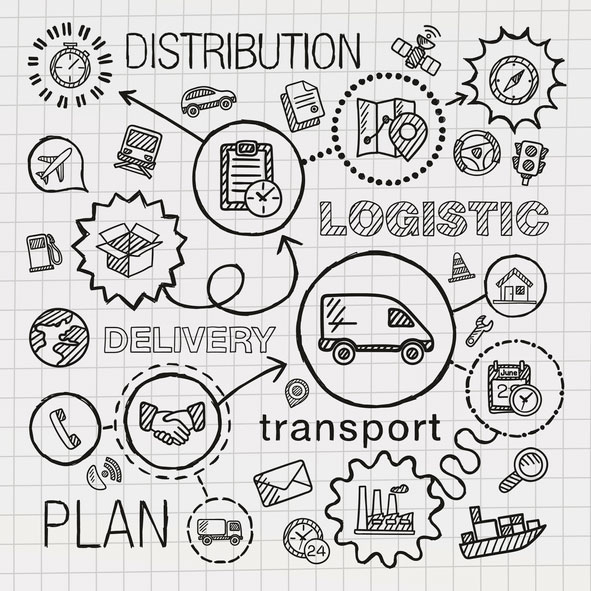Written by Scott Wilson

As a logistics professional, you already knew how critical supply chain management is to society. The epic challenges in the wake of the COVID-19 pandemic made that clearer than ever.
A survey conducted by Oracle in 2021 found that less than half of Americans even thought about where products came from prior to the pandemic. Afterward, more than 90 percent of people included supply chain considerations when making a purchasing decision. Two-thirds believe that supply chain issues impacting their lives will never end.
As a high-level supply chain manager, it’s your job to prove them wrong. You’ll be expected to build resilience and dependability into those systems. And you’ll have to do it while maintaining the utmost efficiency and maintaining razor-thin profit margins.
All of that will have to happen in a world that is just as uncertain as it was during the pandemic. Global climate issues are hitting shipping lanes, production facilities, and air routes. Geopolitical instability is threatening supply sources and open borders.
It’s a lot to navigate. That’s why you’re doing the smart thing for your career and for your industry by looking at master’s degrees in supply chain management now.
What Is a Master of Supply Chain Management Degree?

Graduate studies in any field signify a high level of commitment and advanced expertise. That’s equally true of supply chain management master’s degrees. They are where you go for in-depth knowledge and cutting-edge research in logistics. And they are the preferred credential for any corporation that wants to bring on an expert who can squeeze every last ounce of efficiency into their procurement or distribution chains.
These aren’t easy degrees to earn. Supply chain management master’s degrees typically take from one to three years to complete. The coursework is far from a cakewalk. And rigorous requirements for research and original thinking will put you through your paces in ways that no undergraduate studies ever could.
To Get Ahead in Supply Chain Management, Master the Details
 It can be hard for people outside the logistics industry to understand the level of complexity that supply chain managers have to juggle every day. But to give them just a taste of what kind of details and what a broad range of subjects the job requires, explain to them why the cost of a can of their favorite beer went up because Americans went on a home remodeling binge during COVID-19.
It can be hard for people outside the logistics industry to understand the level of complexity that supply chain managers have to juggle every day. But to give them just a taste of what kind of details and what a broad range of subjects the job requires, explain to them why the cost of a can of their favorite beer went up because Americans went on a home remodeling binge during COVID-19.
It’s because that can is made from aluminum. Aluminum itself was and is in plentiful supply. But it turns out that most of it is made far from the factories that turn it into cans. And although it’s metal, it’s soft stuff. To survive a sea voyage, a rough rail car trip, or a few hundred miles behind a semi, aluminum must be packaged.
Most manufacturers use wood crates or pallets for the purpose. And that’s where the remodeling comes in. Together with forest fires, environmental regulations, and pest infestations, the surge in demand for wood for remodeling projects suddenly made the price of a humble pallet or grungy old crate shoot through the roof.
And that’s before you start talking about energy price impacts on production, which popped aluminum costs up by some 65 percent over pre-pandemic levels. A pallet of cans that at one point cost $300 skyrocketed to $3,000 in only a month.
Some supply chain managers, however, connected the dots. One brewer in Nevada began stockpiling a three-month supply of cans instead of the previous one-month supply to smooth out costs and availability.
Supply chain managers earn master’s degrees to develop exactly this kind of expertise.
They aren’t inexpensive, either. According to NCES (National Center for Education Statistics) data from 2022, the full cost of tuition and fees can range from $12,394 to nearly $80,000 depending on the length of the program and whether you choose a public or private university.
You come out on the other side of this kind of education with skills that can make any supply chain hum. If you’re angling for top jobs in the field, there’s no better way to prove your worth.
Exploring Different Types of Master’s Programs in Supply Chain Management

The master’s level is where you really dig into various specialties in SCM. Without the general education requirements of bachelor’s programs, you’re free to focus on any of the many niche areas in the field.
They come with titles such as Master of Science in Supply Chain Management, Master of Supply Chain Management, or Master of Science in Logistics and Supply Chain Management. In some cases, you’ll find more focused variations, like a Master of Supply Chain Transportation and Logistics, or a Master of Science in Global Supply Chain Management.
Some programs are also available areas of specialization, such as:
- Analytics
- Logistics Management
- Risk Management
- Global Business
- Sustainability
But with small class sizes and original research opportunities, you can shape your studies toward almost any area of logistics that interests you. An MS in Supply Chain Management with the right curriculum plan can hone your skills in everything from healthcare logistics to retail procurement operations.
Choosing the Right School for Your Master of Supply Chain Management Studies

Naturally, a big part of picking the school for your SCM studies will be finding one with a degree focus that meets your needs. If global supply chain management is where you are heading, you’re probably going to keep your search to schools with that focus.
But there are also many other factors that go into degree quality in a supply chain management master’s. And beyond the education itself, you need to be thinking about ways the right school can boost your professional opportunities.
The qualities you’ll be looking for should include:
Instructors On Your Wavelength
With small class sizes, you’ll have a lot of one-on-one time with instructors. You’d better make sure that they have the kind of teaching ability, experience, and interpersonal skills to make that time worth your while. This is also the level where you will want to focus on the interests and areas of expertise of your professors. A school that has faculty who are specialized and well-respected in their research and publications in the area you want to focus on is pure gold.
Facilities and Resources to Fuel Your Studies
You’re expected to do deep dives into current state-of-the-art in logistics in a master’s program, so you’d better make sure your school has the resources to support you. Big data, industry journals, and labs to play with data and software are a plus. Some colleges also establish campus centers for excellence and innovation in various supply chain and logistics issues. Whether it’s a center of research on transportation or a research lab on decision science, you will want a school that has industry-leading expertise in subjects near and dear to you.
Peer and Academic Support Services to Get You Through the Tough Spots
No one earns a master’s in supply chain management on their own. Whether it’s an academic adviser pointing out a way to maximize efficiency in your own class scheduling chain, or a fellow student who proofs your final capstone project for you the night before the presentation, you’ll be well-served picking a school that has sterling support. Caring academic counselors, campus writing labs, and student groups focused on the industry are all big pluses.
Industry Connections with Big Supply Chain Players
The odds are good you’re already working in supply chain management by the time you get around to looking at master’s degrees. But that doesn’t mean your career can’t benefit from being plugged in to the major players in logistics. A school that routinely does consulting work and engages in joint projects with big names like Boeing, Amazon, UPS, FedEx, Maersk, and other global powerhouses is going to put you shoulder-to-shoulder with good contacts to have. Just as important, you’ll get insights into those systems and operations that will make you a good investment not just for the Fortune 500, but for any company hiring supply chain managers that do business with them. Which is every company, everywhere.
These are all factors that lead to strong reputations and high rankings. While you can count on that to some extent, it’s also very much worth doing your homework to make sure what’s on offer lines up with your needs.
Looking at the Role of Specialty Accreditation in Master’s of Supply Chain Management Programs

For the most part, master’s in supply chain management programs are offered through business schools. In those cases, one additional consideration should be whether the school holds a specialty accreditation from one of the three agencies that cover the field:
- AACSB (Association to Advance Collegiate Schools of Business)
- IACBE (International Accreditation Council for Business Education)
- ACBSP (Accreditation Council for Business Schools and Programs)
These organizations go above and beyond the general accreditation that every competent American university already holds. They have close industry ties and experts who can evaluate the very specific standards that the larger business community has for graduate degrees. A specialty accreditation is a strong stamp of approval for any business school that holds it, and ensures you’re getting a worthy education in return for your studies.
Specialty accreditation shouldn’t be considered an absolute must, however. An SCM program offered by a college engineering department or other non-business school won’t even be eligible—that doesn’t mean the quality is necessarily lower.
Should You Explore Earning a Master’s in Supply Chain Management Online?
It’s natural at this stage of your career to think about an online master’s in supply chain management. You’re already well into your career path by the time you consider going back for a graduate degree. You probably aren’t excited about the idea of taking time off for school. And you are more likely to have put down roots. Relocating to a college town for a year or two is a disruption to friendships and family.
An online supply chain management master’s degree is the easy answer to all those obstacles. Available from any location, you can choose the best school for your needs without having to move or commute. And with flexible course scheduling, you can shift classes around your business and personal obligations. There’s no need to carve out a particular time of day for class—fit in a video lecture at lunch, catch up with class forum chats after putting your kids to bed.
Pursuing a supply chain management master’s online also puts you right into the thick of the future of logistics. Digital tracking, communication, and analytics are the future of the field. By putting your advanced training right into the same arena, you’re absorbing important lessons in how online supply chain management itself can work.
A Focused Curriculum Characterizes Supply Chain Management Master’s Degree Studies

The list of courses offered in a master’s in logistics and supply chain won’t be as broad as you will find in lower-level degrees in the field. But the subject matter will be covered in far greater depth. It will also zoom in on exactly the topics you need to advance your professional expertise.
Coursework you can expect to cover in most master’s of supply chain management programs:
- Management and Leadership - It takes more than just expertise to lead a major logistics organization. You need genuine leadership skills like communications, planning, and mentoring. You need the big-picture view to develop insights and vision into the industry, and to create strategies that will take your organization to the front of the pack.
- Finances and Performance Management in Supply Chains - At this level, there is no separating financial and overall supply chain efficiency. As a senior supply chain manager, you’re paid to shave cents off storage, transport, and delivery costs. This coursework will give you the familiarity with financial accounting systems to make it happen.
- Transportation and Logistics Systems - In order to see the big picture as a supply chain leader, you have to understand the big web that goods pass through. This coursework will take the 100,000-foot view of freight and warehousing processes and functions.
- Analytics, Statistics, and Decision Systems - Insight into supply chains isn’t magic. It comes through careful monitoring, analysis, and consideration. Those are skills taught in these classes, using the latest in tracking, machine learning systems, and decision science. You’ll learn how to gather the information you need and process it to make the right decisions quickly.
- Procurement and Supplier Management - In the big leagues, supply chains extend across many companies. Coursework in procurement processes, contract negotiation, and managing industry connections helps you make a smooth bridge between your organization and those you depend on. Both legal and systems considerations are covered.
There are many different angles to explore each of these topics. A global supply chain focus will come at them from the international perspective, for instance. Your supplier management courses will dive further into the culture of negotiation and business agreements in various countries; transport and logistics classes will cover more maritime and air freight options. Or if you are specializing in risk management, you’ll spend more time looking at diversifying and bullet-proofing your suppliers and transportation links.
On-The-Job Experience Drives Home Lessons from Supply Chain Graduate Courses

Your studies aren’t all going to be in the dry theoretical confines of a classroom. Master’s programs in supply chain management frequently come with internship opportunities, as well. These real-world placements give you a shot at taking knowledge out onto the streets and shipping lanes of the world for a test spin.
In many cases, you’ll get a shot at working within the very industry that you are trying to advance within.
An internship means you’ll be working with experienced supply chain managers who share their hard-won expertise and offer mentoring along the way.
You’ll come away with a much better idea of how to put theory into practice. And you’ll have a valuable web of connections to rely on when you start looking for new positions or even just need support in a current job.
Polishing Off Your Master’s in Supply Chain Management With a Final Project
One of the most valuable aspects of any master’s program is the final project. Whether they come in the form of a written thesis paper, or as a more hands-on capstone project, they force you to take everything you’ve absorbed during the program and put it together to prove you’ve learned it.
These final projects require original research and thinking. You don’t just apply what you have learned in class; you put it all together with your own unique experiences and perspectives and create something new and innovative.
It’s not only a new and effective kind of educational process, but it’s also a calling card for the kind of supply chain manager you plan to be. One of the first things that any hiring committee will be looking at on your resume, right after the degree and school you earned it at, will be the topic of your master’s final project.
Exploring New Interests and Tailoring Your Education Through Elective Courses

Unlike undergraduate programs, there’s not a lot of spare credits to go around in a master’s in supply chain management for elective courses. You may only get two or three classes in addition to your core curriculum.
But those electives can deliver some of the most exciting and interesting coursework you’ll study. They can include subjects like:
- Transportation Economics
- IT Systems and Supply Chain Integration
- Autonomous Vehicles and Automation in Logistics
- Humanitarian Logistics Operations
- Sustainable Supply Chains
- Urban Last-mile Logistics
These are the classes where you can really get into the meat of your own professional interests. You can explore and make a name for yourself with the right combination of elective classes.
Some Master’s of Supply Chain Management Programs Offer Optional Certification Coursework
By the time you enroll in graduate studies in supply chain management, you have already been exposed to how important certifications are in the industry. You probably already have a few under your belt.
But many master’s in logistics and supply chain management go even further in that direction, aligning their coursework with industry-standard certs like the Lean Six Sigma Green Belt or the Certified Supply Chain Professional (CSCP).
Actually earning those certifications usually requires additional experience or passing an exam that happens outside your college studies. But if you can check off the educational requirements while you’re still earning credits toward your degree, you’re coming out ahead.
The Jobs You May Be Able to Access with a Master’s in Supply Chain Management

Graduates with master’s in logistics and supply chain management are expected to provide the future of leadership in the industry. So, most of them will go on to senior positions in various organizations that depend on smooth sailing in the supply chain.
The titles used for these positions can vary from company to company or industry to industry. And there are different areas of responsibility within logistics, too, so graduates can end up with job titles that include:
- Distribution Manager
- Procurement Manager
- Category Manager
- Import/Export Agent
- Sourcing Leader
- Inventory Manager
And of course, there are also many positions specifically for supply chain managers.
You can sometimes work your way into these positions with only a bachelor’s degree. You’ll find a higher ceiling and greater responsibilities with a master’s to your name, though. Vice President of Supply Chain Strategy has a nice ring to it… and it could be yours with a master’s degree and the right experience.
There are elevated expectations that come along with the prestige, though. You’re not throwing boxes in trucks at this level. These are high-end leadership jobs that have hard decisions tied to them. Devising strategy, cultivating important client relationships, meeting regulatory obligations, signing off on big system implementations… there is a lot riding on the knowledge you develop in a master’s program.
Master’s in Supply Chain Management Salary Levels Offer Top Dollar Compensation

Those kinds of jobs can command top dollar in many industries. The Bureau of Labor Statistics puts logistics and supply chain managers into the category of transportation, storage, and distribution managers.
For 2022, the median annual salary for supply chain managers was $98,560.
Of course, that number is likely to include plenty of people who work in jobs that only require a bachelor’s degree. The more advanced types of positions in the field also earn higher salaries. The top ten percent, for instance, made more than $169,070 in 2022.
But you can do even better if you pick the right industry specialization. A master’s degree really allows you to hone your qualifications for very demanding and precise fields, like high tech and biotech. With the right credentials, you could end up in one of the industries that offer the highest salary levels to supply chain managers. The median levels in these industries rival the top ten percent overall:
- Computer and Peripheral Manufacturing - $189,700
- Scientific Research and Development Services - $178,880
- Pipeline Transportation of Natural Gas - $166,560
- Natural Gas Distribution - $158,480
- Semiconductor and Other Electronic Component Manufacturing - $156,640
As with any other type of job, salaries will also reflect local and regional market conditions. A supply chain manager in the shipping hub of New Jersey averages $141,490 per year, the highest median salary for any state in the country. The same position in Michigan, a state with high employment levels for supply chain managers but a declining industrial base, commands only $98,950 per year.
But supply chain management salaries have been climbing in recent years just about everywhere. With a master’s degree in the field, you will be poised to take advantage of future jumps in compensation.
2022 US Bureau of Labor Statistics salary and employment figures for Logisticians and Transportation, Storage, and Distribution Managers reflect national data, not school-specific information. Conditions in your area may vary. Data accessed July 2023.





